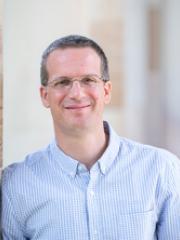Dr Oliver Rawashdeh

Oliver leads the Chronobiology and sleep group.
Available PhD projects
Deciphering the role of clock genes in the transduction of photic information to the master biological clock
Project:
The project aims to identify the components and mechanistics involved in resetting the body’s master circadian clock in the suprachiasmatic nucleus. A detailed understanding of how time-cues entrain the biological clock will be key to develop pharmacological approaches that are aimed to enhance our adaptability to temporal environmental changes i.e. adjusting the speed by which our clocks tick.
Background:
Jetlag and Social-lag are terms used to describe symptoms associated with the disruption of the body’s “internal clock”. This disruption, or desynchronosis, can occur (1) when flying across multiple time zones, (2) during shiftwork, (3) due to a misalgnment between the body’s internal clock and social time and (4) in diseases and during ageing. The symptoms include loss of appetite, insomnia, mild depression, altered mood, headaches, nausea and reduced physical and mental performance. Jetlag symptoms gradually wear off as the body adapts to the new time zone and social cycles. Thus, accelerating the adaptation process or reinstating circadian rhythms in disease and during ageing means reducing symptomatology and improving the quality of life.
Scholarship:
This project is fully funded and inlcudes a scholarship top-up.
Sleep and circadian dysfunction in neurodegenerative diseases
Project:
We have a long-term interdisciplinary research program to study sleep and circadian rhythms in neurodegenerative disorders. The expertise of our collaborative groups spans from chronobiology, neuroscience, pharmacology, to engineering and maths. Together we are working on urgent translational research questions. We are seeking highly motivated, curiosity-driven students interested in joining the team to pursue a Ph.D. in Neuroscience in the area of sleep and circadian rhythms in neurodegeneration and related therapeutic avenues. The Ph.D. candidates will take interest and leadership in formulating scientific questions, develop new techniques, and mechanistic/therapeutic solutions. Training to design experiments and learn new methods will be provided. The Ph.D. candidate will be supported by lab staff. Unique lab skills in emerging fields and initiatives within the broad framework are welcomed.
Educational background:
A BSc. Honours (Class1) or MSc. in science, biomedical sciences, biomedical engineering, neurosciences, biochemistry, or related disciplines is required. Candidates with experience in small animal neuroscience research, biochemistry, animal behaviour, are strongly encouraged to apply.
Scholarship:
This project is fully funded and includes a scholarship and top-up funds.
Modelling the interaction between sleep and the biological clock in health and disease
Project:
We have a long-term interdisciplinary research program to study sleep and circadian rhythms in health and disease (e.g., neurodegenerative disorders). The expertise of our collaborative groups spans from chronobiology, neuroscience, and pharmacology. Together we are working on urgent translational research questions. For this project, we are seeking a highly motivated, curiosity-driven student interested in the Neuroscience of sleep and circadian rhythms, specifically on the mathematical modeling of the regulatory interaction between the biological clock and sleep in health and disease. The Ph.D. candidate will take interest and leadership in formulating scientific questions, develop new techniques, and mechanistic/therapeutic solutions. Training to design experiments and learn new methods will be provided. The Ph.D. candidate will be supported by lab staff. We welcome unique lab skills in emerging fields and initiatives within the broad framework.
Educational background:
A bachelor’s in Science, BioMed, Mathematics, Engineering, and Computer science are welcome.
Scholarship:
This project is fully funded, scholarships and top-up funds are also available.
Researcher biography
I received my Bachelor's in Biology (2001) from Yarmouk University in Jordan, followed by postgraduate degrees from the University of Houston in Houston-Texas (2002-2007). My studies are integrative in nature, joining the best of both the Neuroscience world and Circadian Biology (the study of biological clocks). In the laboratory of Prof. Arnold Eskin, I investigated how processes as complex as learning and memory are modulated by biological clocks i.e. the circadian (about 24 hours) system, using Aplysia californica as the experimental model. After completing my Master's in Science in 2005, my research focused on the mechanism by which biological clocks modulate learning and memory. This work was performed in the laboratories of Prof. Gregg Cahill and Prof. Greg Roman, experts in chronobiology and behavioral neuroscience, respectively. Using Zebrafish as a model system, I investigated the role of melatonin, a night-time restricted hormonal signal, in modulating long-term memory consolidation. My findings, published in Science in 2007, shows that the circadian system via the cyclic night-time confined synthesis/release of melatonin "the hormone of darkness" functions as a modulator, shaping daily variations in the efficiency by which memories are processed. After receiving my Ph.D. in 2007, I joined as a postdoctoral fellow the laboratory of the pharmacologist and melatonin researcher Prof. Margarita Dubocovich. My postdoctoral work engaged in elucidating the role of melatonin in circadian physiology and pharmacology during development and ageing in rodents (Mus musculus) and non-human primates (Macaca mulatta) at the Feinberg School of Medicine (Northwestern University-Chicago) and the State University of New York (SUNY). From 2010-2015, I held a teaching/research position in the Dr. Senckenbergische Anatomy and the Dept. of Neurology at the Goethe University in Frankfurt-Germany. During this time, I was involved in teaching gross human anatomy while continuing my endeavor in understanding the mechanistics involved in shaping memory processes (acquisition, consolidation and retrieval) by the circadian system.
